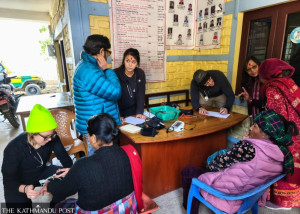Health
Nepal to vaccinate all 10-year-old girls against HPV early next year
About 350,000 girls are eligible for the vaccine against cervical cancer.
Post Report
All girls aged 10 years of age or those studying in class six will be administered the human papillomavirus (HPV) vaccine in Falgun (mid-February to mid-March) under the routine immunisation schedule.
Although the HPV vaccine has been included in the routine immunisation list, officials say that the vaccine will be administered in the month of Falgun every year.
“We have estimated that around 350,000 girls are 10 years old,” said Dr Abhiyan Gautam, chief of the Immunisation Section at the Family Welfare Division under the Department of Health Services. “Health workers will administer the vaccine to those studying in class six in the schools, and others who are 10 years of age and don’t go to schools will also be administered the vaccine from health facilities.”
Human papillomavirus is a viral infection that spreads through skin-to-skin contact and is a leading cause of cervical cancer—the second-most common cancer in the developing world. Cervical cancer is a major cause of death among Nepali women, with hundreds diagnosed every year.
Although the exact number of patients suffering from cervical cancer in Nepal is not known, it is estimated that every day, at least four women die of the disease. BP Koirala Memorial Cancer Hospital in Bharatpur said that more than 700 women suffering from cervical cancer seek treatment at the hospital every year.
A cervical cancer screening carried out by the Kathmandu Metropolitan City in July this year found 126 women in the city infected with human papilloma virus.
Of 2,564 samples tested during the screening, 28 women were found infected with HPV types 16 and 18, which are responsible for 70 percent of cervical cancer. The remaining 98 tested positive for other types of HPV.
The testing was carried out in the laboratory of the Bir Hospital and only HPV types 16 and 18 were tested as officials said that neither the city office nor the Bir Hospital had testing kits of other HPV types.
Doctors say HPV exists in more than 100 different forms, ranging from low-risk to high-risk infections. HPV types 16 and 18 are frequently associated with invasive cervical cancer compared to other types, meaning that they are more carcinogenic than other types.
They say most cases of cervical cancer are associated with HPV. Widespread immunisation could significantly reduce the impact of cervical cancer and other HPV-related cancers. Early treatment can prevent up to 80 percent of cervical cancer cases, according to them.
The Ministry of Health and Population launched a nationwide HPV drive in February-March this year in which around 1.5 million girls between 11 and 14 were inoculated with a single dose of HPV vaccine.
Experts say the HPV vaccine is effective if it is administered before getting sexually active. Efficacy rate on adult women or after getting sexually active is low.
The Global Alliance for Vaccine and Immunisation (GAVI) has supplied required vaccine doses for the campaign. Officials say that the alliance has committed to supply vaccine doses for routine immunisation programmes also.
The World Health organisation says HPV vaccination is recommended as part of a coordinated strategy to prevent cervical cancer and other diseases caused by the virus. According to the UN health body, cervical cancer is the fourth most common cancer in women worldwide and claims over 350,000 lives each year.




 10.12°C Kathmandu
10.12°C Kathmandu













